2-Month-Old Baby's Development
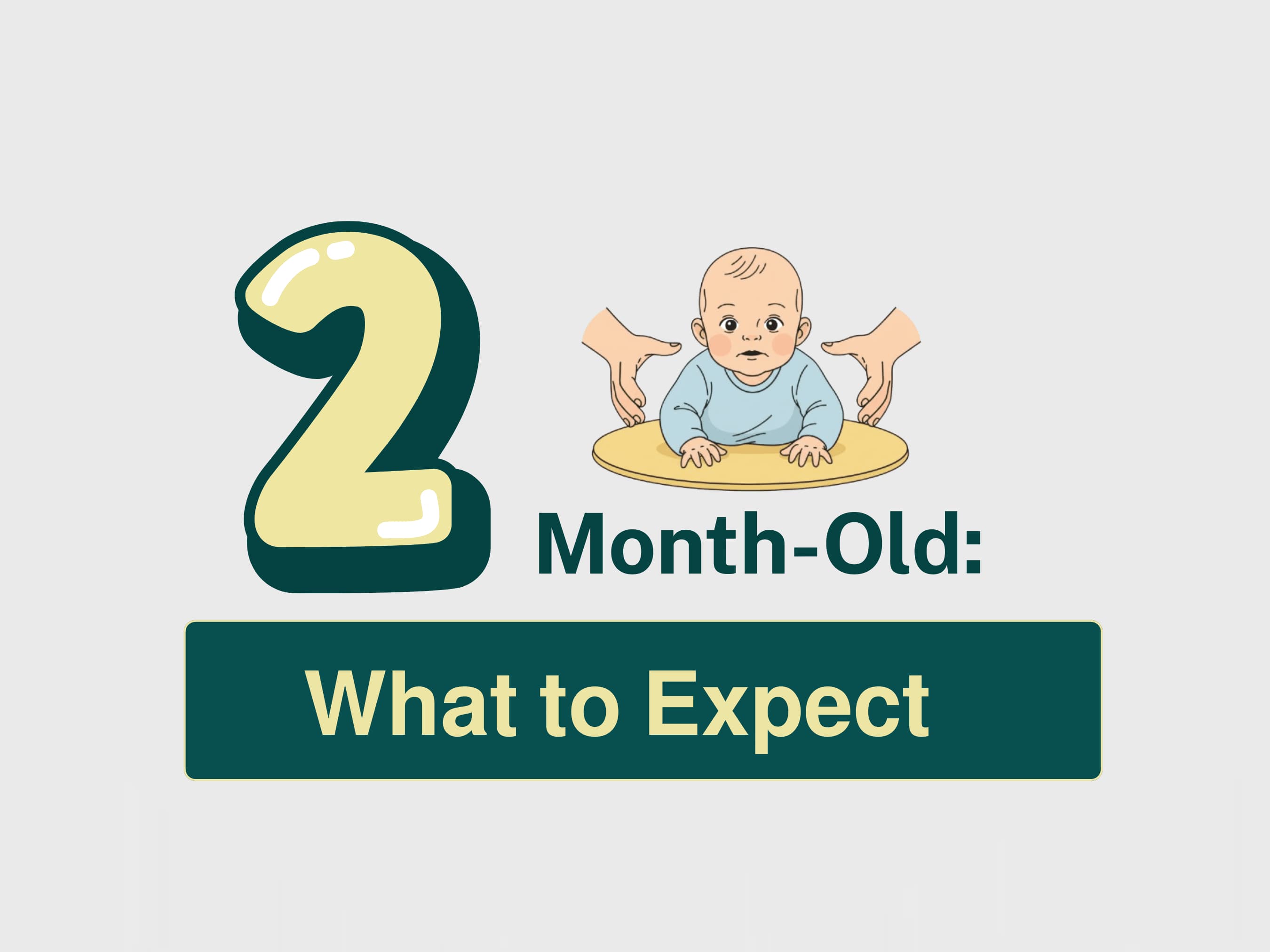
Written by Mindsmaking Medical Writer
Fact Checked by Mindsmaking Professionals
3rd, October, 2025
At 2 months, your baby is growing fast with new physical and motor skills. From tummy time to first smiles, here is what to expect and how to encourage healthy development.
Finally, you and your baby have reached the 2-month-old milestone. Even when it does not seem like a big deal to others, this development is another amazing feat worth celebrating.
You have made it through constant feeding, sleepless nights, and postpartum stress while watching your baby progress week by week. Now, look at your sweet and growing little baby as they are putting a smile on your face in the best way possible. You deserve your flowers because you have actually outdone yourself.
While you may have expectations for your baby's growth, understand that each baby is unique and they develops according to their own pace. So, instead of worrying, take your time to understand your 2-month-old's development.
Key Takeaways
By 2 months, your baby is gaining head control, moving arms and legs more purposefully, and growing steadily, while tummy time strengthens muscles for future milestones.
At 2 months, many reflexes like rooting, grasping, and stepping begin fading, while the sucking reflex strengthens, reflecting your baby’s growing muscle control and brain development.
Around 2 months old, your baby starts cooing and gurgling, recognizes familiar voices, tracks faces, and responds to sounds, signaling early communication and sensory growth.
During the second month, your baby tracks moving objects, studies patterns and faces, and begins linking routines with comfort, showing early curiosity and cognitive growth.
In their second month, your baby begins genuine smiling, responds to your voice and face, and shows early emotional expressions, building trust and social connection.
During the second month, your baby feeds 7–9 times daily and sleeps 14–17 hours in short naps, supporting growth while gradually forming longer sleep stretches.
At 2 months, your baby’s growth, reflexes, and motor skills are checked, while receiving essential immunizations to support health and development.
Everyday interactions, such as tummy time, talking, singing, and offering safe toys, help your 2-month-old strengthen muscles, develop senses, and build emotional bonds.
If your 2-month-old has fewer than 4 wet diapers, unusual drowsiness, fever, poor responsiveness, or breathing issues, contact a doctor promptly to ensure their health and safety.
Physical Development
If you are a mom or caregiver, one of the first things you’ll notice in your 2-month-old is how quickly their little body is changing. From head to toe, every day brings something new, and you might just catch yourself staring in awe.
Physical Development

Head Control
Head strength develops gradually and may take up to 6 months. At 2 months, your baby can briefly lift their head during tummy time and turn it from side to side, showing more control than in their 1-month-old baby's development.

Arm and Leg Movements
Movements are becoming less jerky and more purposeful. Expect energetic kicks and arms moving in circular, playful motions. It’s their way of practicing coordination.
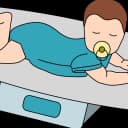
Growth and Weight
By now, many babies outgrow newborn clothes. On average, boys weigh around 11.5 pounds and measure 23 inches, while girls weigh about 10.5 pounds and measure 22.5 inches. Don’t stress if your baby is above or below these numbers; steady growth matters more than exact figures.
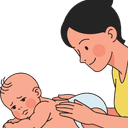
Tummy Time
Placing your baby on their tummy is important for building neck, shoulder, and arm strength. Do this while they’re awake and supervised. It helps with future milestones like sitting and crawling, while also preventing flat head syndrome (flat spots) on the head. Tummy time also improves your baby's motor skills (ability to control their muscles).
Reflexes
You have come a long way with your 2-month-old baby, so you likely already know that most of your baby's movements are involuntary reflexes. This means they move without even trying to. When a bright light appears, they shut their eyes even when they do not plan to. They may also suck on your hand if you place it at the roof of their mouth. These are just natural survival instincts for them. As your baby progresses into two months, some of these reflexes will fade away, and others will become stronger.
Babies at this stage are beginning to gain more head control, so they no longer turn their cheeks towards every stroke and touch. Therefore, the rooting reflex will start fading away. The grasping reflex also begins to fade at 2 months as your baby no longer grips because it is unplanned, but because it is intentional. The stepping reflex also disappears at 2 months and reappears towards the end of the first year as your baby is learning to walk. Meanwhile, your baby's sucking reflex will become stronger and more coordinated at this stage.
Yes, you care about your 2-month-old baby, but do not be disturbed if some of these reflexes start fading away. This is completely normal and a sign that your baby's brain and muscles are maturing or developing.
Communication and Senses
Another aspect of your 2-month-old baby’s development is communication and senses. Remember that every aspect of your baby's development is happening simultaneously, and you don't want to miss a step. Now, did you hear a sound other than crying? Yes, that is your baby at 2 months old. Now, you can see how exciting all of these are turning out to be. This marks the beginning of your baby's exploration of sounds. At this point, you will see your baby cooing, gurgling, and making vowel-like sounds. It may begin with “ooh,” or “aah,” but it marks the start of speech or language learning for your baby. Soon enough, your baby will start directing these sounds to toys, objects, and even people around, including you.
Your baby's senses, such as hearing and sighting, also begin to develop at 2 months old. You will notice this in the way they respond to voices and track faces. If you talk, your baby may turn their head towards you, quiet down, or even smile. This also happens when they hear familiar voices. They even enjoy eye contact and may stare at you during breastfeeding.
Babies at 2 months old usually recognize familiar voices, especially that of their parents. They also seem to respond to high-pitched voices, which is why many people exaggerate their speech when talking to newborns. So, you may want to mix some tone to your speech, just to encourage your baby's speech process.
Read This Next
No posts available
Cognitive Development
If you are wondering, your baby's brain is also developing at 2 months old. Cognitive development mostly involves your baby's ability to track moving objects, recognize familiar faces, sounds, and social interaction. Here are some common cognitive markers for your 2-month-old baby:
- Your baby starts following moving objects with their eyes.
- Your baby stares at patterns, shapes, and contrasting colours.
- Your baby begins to associate routines such as feeding, rocking, and bedtime with comfort.
- Your baby begins to show early signs of curiosity, such as trying to touch objects within reach, staring at faces for long, and responding to sounds.
While it is still very early, these actions show your baby's growing awareness and responsiveness to their environment. This is a sign that their mental growth is progressing beautifully.
Social and Emotional Development
At 2 months, your baby is starting to show a little more personality, and yes, those first real smiles are finally here. Not the random sleepy ones, but genuine grins that seem to say, “I know you, and you’re my favorite human.” It’s the kind of moment that makes all those diaper blowouts and sleepless nights feel instantly worth it.
You’ll also notice your baby becoming more interactive. They might gaze at your face like you’re the most fascinating thing in the world, quiet down just to listen to your voice, or reward you with a coo when you sing that off-key lullaby for the tenth time. Forget TV, at this stage, you are the star of the show, and your baby can’t get enough.
As they grow, their emotional expressions expand. Smiles, coos, cries, and even sucking on their hands show they’re learning to regulate emotions and connect with you. It’s their way of saying, “When I need comfort, you’re there,” and in that exchange, trust and attachment start to bloom. This is proof that your bond is growing stronger every day.
Feeding and Sleep
Your baby’s main hobbies at 2 months old are still eating and sleeping, basically living the dream life we all secretly want back. Expect about 7–9 feeds in a day, whether breast or bottle. Some nights might surprise you with a longer stretch of sleep, but yes, those frequent wake-up calls are still part of the package. Every feed is like a little fuel stop, powering up your baby’s growth spurt.
Sleep-wise, think of it as a series of short naps adding up to 14–17 hours a day. Daytime naps can feel like a blink-and-you-miss-it moment or a luxurious mini-break, while nighttime sleep is slowly stretching out into longer blocks. Each snooze, no matter how short, is hard work for your baby’s brain and body, though it might not feel like “hard work” at 3 a.m. when you’re wide awake. Here are some tips to help you ride the feeding-and-sleeping rollercoaster with your little one during their 2-month-old development stage:
- Follow your baby's hunger cues, as this helps you feed them when they truly need it, not just at random times.
- Create a gentle bedtime routine, as this helps signal to your baby that it is time to sleep and feel calm.
- Trust yourself, as this helps you respond confidently to your baby’s needs and build their sense of security.
Important Milestones to Note
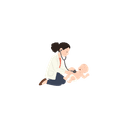
Doctor’s Check-Up
At 2 months, your pediatrician will measure your baby’s weight, length, and head circumference to track growth. They’ll also check reflexes, motor skills, and responsiveness, and answer questions about health, feeding, and sleep.

Immunizations
Your baby will receive their first round of vaccines to protect against diphtheria, tetanus, pertussis (whooping cough), polio, rotavirus, Hib, and pneumococcal infections. These shots are vital for safety and long-term health.

Parent Preparation
Before any appointment, write down questions or observations about your baby’s feeding, sleep, and development. This ensures a productive visit and helps you address concerns early.
How to Encourage Development
If you want to support your 2-month-old baby’s development but aren’t sure where to begin, the good news is that everyday interactions make a big difference. At this stage, your baby is learning through movement, sound, and connection, so even small, consistent activities can help strengthen their body, sharpen their senses, and build emotional bonds. Here are some simple, practical ways to nurture their growth and development:
- Place your baby on their tummy for a few minutes each day while awake and supervised to strengthen neck, shoulder, and arm muscles.
- Talk, sing, and read aloud often; your voice encourages listening, learning, and early communication.
- Offer safe toys with high-contrast colors or gentle sounds to motivate curiosity about shapes, patterns, and sounds.
- Respond to every coo, smile, and gesture to build trust, communication, and emotional bonding.
When to Call a Doctor
It is fine to feel unsure about what is normal and what needs urgent attention if you are a mom. At 2 months old, your baby is still very delicate, so keeping an eye out for warning signs is important. While most changes you notice will be part of healthy growth, there are certain situations where you should reach out to your doctor right away.
Call your doctor if your baby has fewer than 4 wet diapers in a day, as this could mean they are not getting enough fluids. Also, if your baby is unusually hard to wake or seems very drowsy all the time, do not ignore it. A fever of 38°C (100.4°F) or higher in a 2-month-old always needs medical attention, so it is advisable to seek medical attention.
Other signs include your baby showing no response to loud sounds, not giving social smiles, or if you notice any breathing difficulties, such as fast, noisy, or labored breathing. These could all be indicators that something is not right. Trust your instincts if something feels off with your baby. It is always better to seek medical advice.
Motherhood is a journey filled with both excitement and challenges, and you are walking it beautifully. You and your baby have come this far together, learning, growing, and bonding. Give yourself credit because you truly are doing an amazing job.
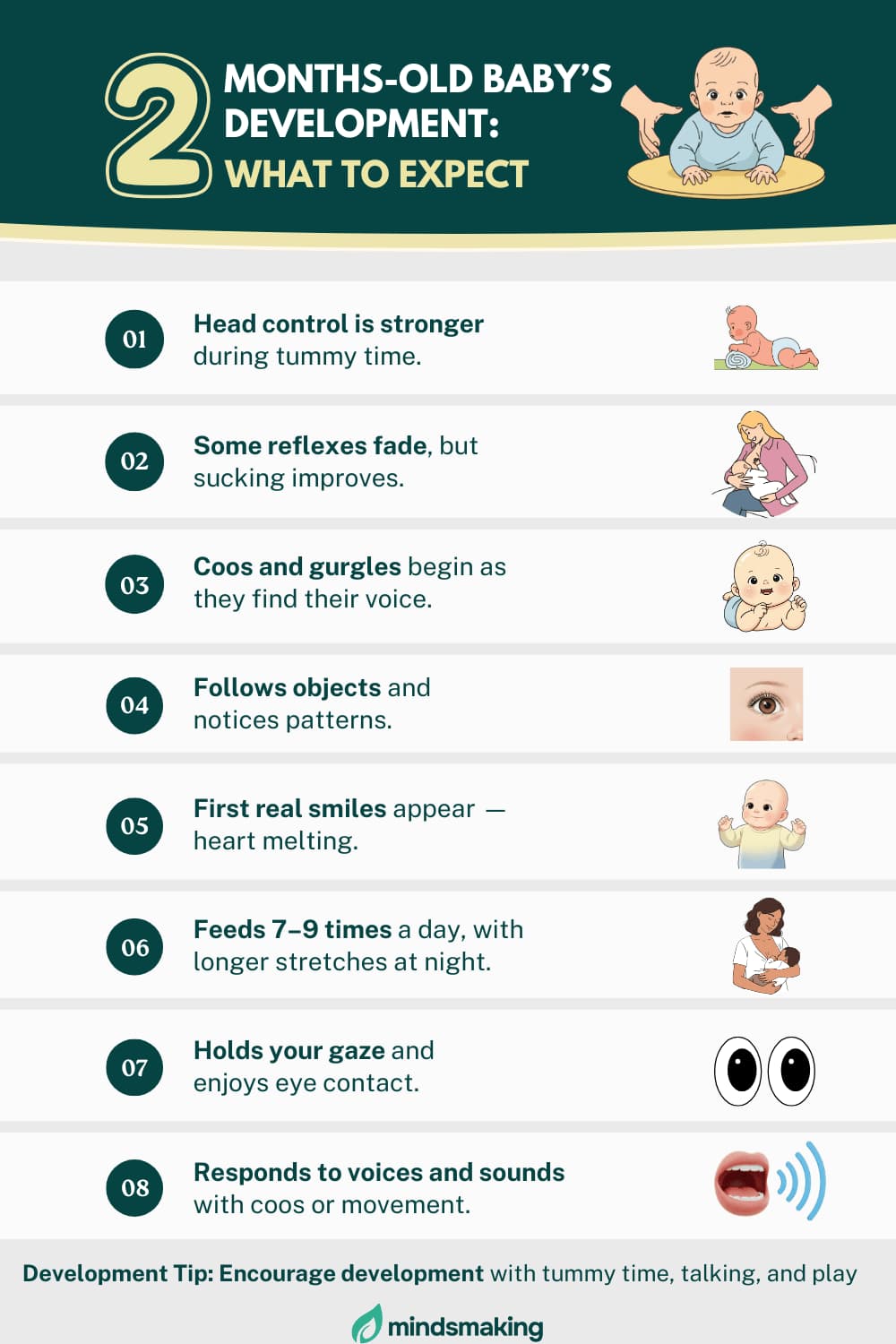
Was this article helpful?
How many stars are you giving this article?
Leave a comment
Your email address will not be published.